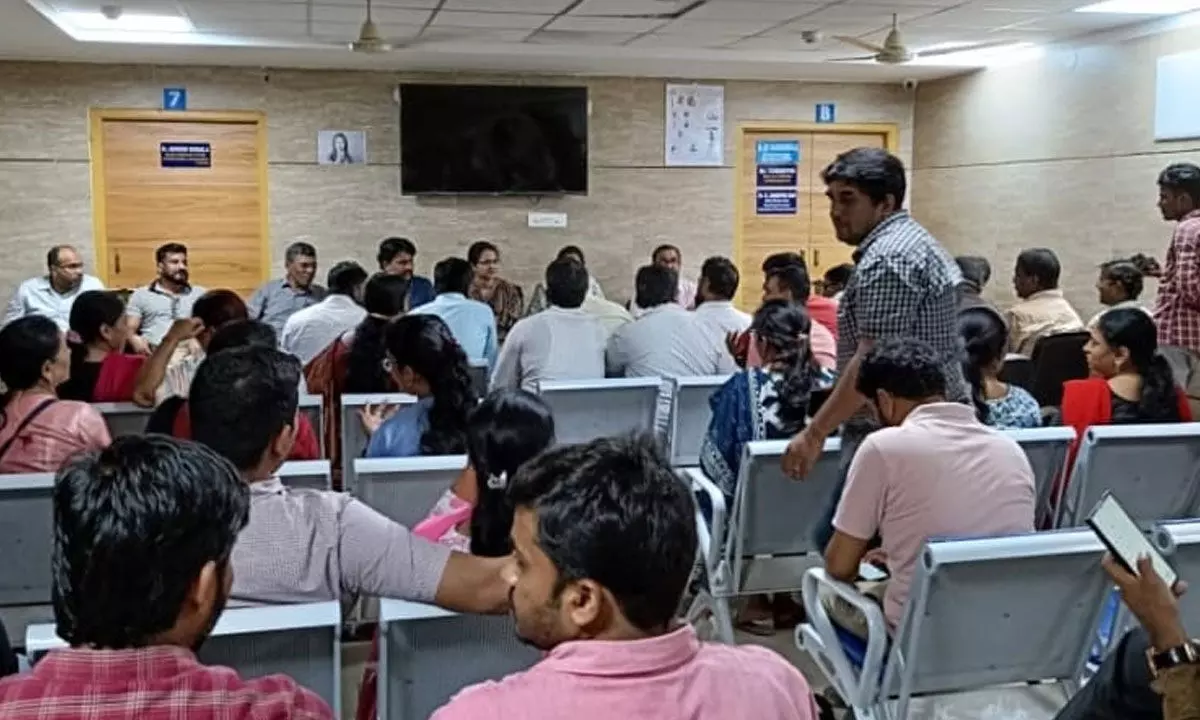Private hospitals stopped their services for three days against the alleged attack on Ananta Hospital

In protest against attacks on private hospitals, medical services will be suspended for three days in all private hospitals in Gadwal?
Gadwal: In protest against attacks on private hospitals, medical services will be suspended for three days in all private hospitals in Gadwal??
Decision of the Association of Doctors of Private Hospitals
It is okay to stop all medical services for three days
Last night in Ananta Hospital, some people attacked the staff and the hospital very badly
A private hospital was shut down for three days in Jogulamba Gadwal district in protest against the attack.
Attacking a private hospital can lead to several legal consequences under Indian law, as such acts are considered serious offenses. The potential legal consequences including, Criminal Charges : Offenders can be charged under various sections of the Indian Penal Code (IPC), including but not limited to:
Section 147 : Rioting.
Section 148n: Rioting, armed with a deadly weapon.
Section 323 : Punishment for voluntarily causing hurt.
Section 324 : Voluntarily causing hurt by dangerous weapons or means.
Section 427 : Mischief causing damage to the amount of fifty rupees.
Section 452 : House-trespass after preparation for hurt, assault, or wrongful restraint.
Damage to Property Act : Under the Prevention of Damage to Public Property Act, 1984, individuals can be penalized for causing damage to public property, which can be extended to private hospital property if deemed necessary.
Hospital Protection Act : Specific states in India have enacted the Hospital Protection Act (e.g., Maharashtra Medicare Service Persons and Medicare Service Institutions (Prevention of Violence and Damage or Loss to Property) Act, 2010). Under these acts:
- The offender can face imprisonment up to 3 years and/or a fine up to ₹50,000.
- The offender is also liable to pay compensation for the damage/loss caused to the property of the hospital.
4. Civil Liability : Hospitals can also file civil suits seeking damages for the destruction of property, loss of revenue, and other consequential losses.
5. Arrest and Detention : Immediate arrest and detention of individuals involved in the attack may occur, followed by legal proceedings.
6. Professional Consequences : Healthcare professionals involved in such acts may face professional consequences, including suspension or cancellation of their medical licenses.
The legal system in India treats attacks on healthcare institutions with utmost seriousness to ensure the safety and security of medical professionals and facilities.
As well as When medical negligence leads to the death of a patient in India, it can result in both criminal and civil consequences for the medical professionals involved. Here are the potential legal outcomes:
Criminal Consequences
1. Criminal Charges : The responsible medical professional(s) can be charged under various sections of the Indian Penal Code (IPC), including:
Section 304A : Causing death by negligence. This section applies when a death occurs due to a rash or negligent act and can result in imprisonment for up to two years, or a fine, or both.
Section 337 : Causing hurt by act endangering life or personal safety of others.
Section 338 : Causing grievous hurt by act endangering life or personal safety of others.
2. Arrest and Detention : The medical professional(s) involved may be arrested and detained, followed by legal proceedings.
Civil Consequences
1. Compensation Claims : The deceased patient's family can file a claim for compensation under the Consumer Protection Act, 2019. If the medical services are found deficient, the responsible medical professional(s) or hospital may be ordered to pay compensation for the loss and suffering caused.
2. Damages for Wrongful Death : The family can also file a suit for damages under the Law of Torts for wrongful death, seeking monetary compensation for the loss of the deceased's support, services, and companionship.
Professional Consequences
1. Disciplinary Actions : The medical professional(s) involved may face disciplinary actions from the Medical Council of India (MCI) or the respective state medical council. This can include suspension or cancellation of their medical license.
2. Reputation Damage : The medical professional(s) and the hospital may suffer significant reputational damage, impacting their practice and patient trust.
Legal Process
1. Filing a Complaint : The aggrieved party can file a complaint with the police, leading to a criminal investigation. Simultaneously, a complaint can be filed with the Consumer Disputes Redressal Commission for compensation claims.
2. Investigation and Trial : A thorough investigation will be conducted to determine if there was medical negligence. If sufficient evidence is found, the case will proceed to trial.
3. Burden of Proof : In criminal cases, the burden of proof is on the prosecution to establish negligence beyond a reasonable doubt. In civil cases, the burden is on the complainant to prove that the standard of care was not met and that this resulted in the patient's death.
Conclusion
Medical negligence leading to the death of a patient is treated with seriousness in India, involving criminal, civil, and professional consequences for the responsible medical professionals. The legal system aims to ensure accountability and justice for the aggrieved parties while upholding the standards of medical practice.
















